- Home
- Karen Traviss
The World Before Page 4
The World Before Read online
Page 4
F’nar’s autumn weather was cool rather than cold but the pearl layer gave the impression of a heavy frost. Eddie was almost as used to its optical illusions as to its over-length days and higher gravity. On this overcast morning, his room in Nevyan’s home had been flooded with a cold white light that made him think he had woken up to overnight snowfall.
It could have been a magical experience. But the threat of a war that he couldn’t leave behind on the next available flight stripped the gloss from it. He was heading to the Exchange of Surplus Things to hear about the next escalation in the conflict with the humans.
“I still think it’s odd that you lot haven’t stayed in contact with each other,” said Eddie. Eqbas Vorhi had responded to Wess’ej’s appeal for military support. If Wess’ej represented the isolationist liberals, the Eqbas were going to make interesting neighbors. “We would.”
“What would the purpose of that be if we wished to lead separate lives? And your species originated in Earth’s tropics. Do you stay in touch with Africa every day?”
Giyadas had him there. Even the kids here had that inexorable in-your-face logic from an early age.
The wess’har around him seemed as agitated by the prospect as Eddie was. He was passing through a phase of being stunned by how alien they were. The novelty of seeing extraterrestrial life in the flesh had palled quickly, but that was when he was buffered by the company of other humans. Now he was the minority alien, living in an alien household, and he had become increasingly aware that the only other creature on the planet that looked remotely like him was Ade. Even Aras—reshaped by his c’naatat over the years into a theatrical approximation of a man—was two meters tall and built like an armored vehicle. And he had claws.
“Doesn’t Nevyan worry when you’re out on your own, kid?” Giyadas was probably the equivalent of a human six-year-old. She kept up with him as he walked towards the Exchange, her tufted mane of amber hair like a Spartan soldier’s helmet. It was like looking down on a rocking horse. “Did you tell her you were going out?”
“Why should she worry?”
“Well, what if—”
Eddie stopped himself from explaining what could happen to a small child out on its own on Earth. No, there were no what-ifs in F’nar. Anyone could walk down its terraces in complete safety. Wess’har were communal, responsible creatures who regarded the exploitation of any other animal as the worst possible crime. There were no gangs, no speeding traffic, and no muggers.
And then—suitably provoked—wess’har would wage war without pity and wipe out millions. Chilled or punching—that was how Shan had described them. They didn’t have a middle setting. Humankind was about to find out what wess’har were like when they were really punching.
“I want to go to Mar’an’cas,” said Giyadas. The isanket was taking her future role as a matriarch seriously. Talking to her was like blotting old-fashioned ink, the information instantly absorbed and faithfully reproduced yet somehow reversed. “I want to see the gethes from Constantine colony.”
“Why?”
“To see why they’re different from you. I want to know why they killed the bezeri.”
“They didn’t, sweetheart. They helped someone else do it. And it was just a couple of them. They believe in God and that makes humans do some pretty strange things.”
Giyadas skipped a step. “Sergeant Bennett said it was bollocks because if there was a real god he wouldn’t let humans behave the way they do.”
So Ade Bennett had taken on the mantle of teaching the wess’har inappropriate English. They’d already absorbed way too much from Shan, and Giyadas was picking it up faster than any of them.
Eddie shrugged. “But the why doesn’t matter to wess’har, does it? You only care about what’s done, not why it was done.”
“Knowing is not the same as caring. If we don’t know why, how can we stop it happening again?”
“You sure you’re a kid and not just a bit short for a wess’har?”
“I don’t understand.”
“Never mind.” Eddie slowed as he merged with the crowd of wess’har approaching the Exchange of Surplus Things. His instinct was to grab Giyadas’s hand and make sure she wasn’t crushed, but the adult wess’har towering above her gave her plenty of space. He took her hand anyway and she looked up at him as if he were mad. “So you’ve been talking to Ade, have you?”
“He wants his friends back.”
“The other Royal Marines?”
“What’s royal? What’s the sea got to do with it?”
“It’s just an old regimental title. They were sea-going soldiers.”
“Will he be our soldier now?”
“I don’t know. I don’t think any of us know what’s going to happen next.”
But Ade couldn’t go home again, not with the c’naatat parasite colonizing his body.
The sergeant was sitting on a packing crate in the Exchange of Surplus Things, the nearest that F’nar had to a center of government, a great vaulted hall cut deep into the wall of rock that cradled F’nar. It was a warehouse where wess’har deposited surplus crops and took others that they needed, without tally or inventory, and the bounty was never abused. It was the sort of system that would never work on Earth in a million years.
Ade didn’t look at all changed by c’naatat. He still appeared on first glance like an anonymous, average bloke somewhere in his thirties, maybe early, maybe late. It took another glance to register that he was exceptionally fit and taking discreet note of everything around him.
But he hadn’t turned into a two-meter alien; whatever the parasite was doing to him, it was doing it internally. He nodded acknowledgment but didn’t get up. Eddie sat down beside him and Giyadas stood staring into his impassive face, far too close to be anything but annoying.
“Hi,” said Ade, cornered. His voice always seemed too soft for a man who was supposed to bark orders. “You’re growing fast, aren’t you?”
“Are you remembering what Shan remembered?”
“Sometimes, sweetie.”
“You must find that a comfort.”
Then she disappeared into the crowd to find Nevyan. They were nearly all males and even Nevyan—shorter than the average matriarch—stood almost a head above them.
“I think they’re about fifty when they’re born,” said Eddie.
“They don’t so much grow up as acquire more knowledge.”
“That’s very perceptive.”
Ade glanced at him sideways and Eddie knew he had seen that warning expression before. It was Shan’s. Nobody knew just how many components of a previous host c’naatat would whip out like a conjuring trick. This looked like one of them.
“I wasn’t being patronizing,” said Eddie, responding to the disapproval of a dead woman.
“The kid’s wrong. I don’t find it comforting.”
“You getting flashbacks? Aras does, all the time.”
“Yeah, one in particular. A gorilla and the bloody awful feeling of having let someone down when they needed me.”
“I can tell you about the gorilla.”
“Later, maybe.” Ade had a quiet finality about him when he wanted to change the subject. “What are we waiting for? Match of the Day?”
“Live from Eqbas Vorhi.”
“They don’t play soccer, do they?”
“No. They don’t play anything. Apparently Nevyan’s going to be talking to a couple of Eqbas matriarchs. What we’re looking at is a city called Surang.”
The huge image in the wall—part of the stone itself, it seemed—showed a static view of Surang, at once wholly familiar to Eddie yet shocking. It was every live news feed from a foreign city that he had ever seen, and he half-expected a colleague to amble into shot, adjust an audio implant and ask the gallery how long it was to air.
And it was also a window onto an alien city that was exotic even to the wess’har around him.
Surang was astonishing. It was the first shot he’d seen that took i
n so much of the city skyline, all impossible curves and billowing organic shapes that reached up into the sky like a growth of oyster mushrooms on a tree. There was a lot of vegetation; but there was also plenty of building. If the wess’har in F’nar built to avoid being seen, then their cousins appeared to represent the less discreet pole of architectural philosophy.
Surang was a statement, whether it meant to be or not. It said look what we can do, monkey boys.
Eddie wanted to get those pictures down the ITX as fast as he could find a way of linking into the feed. The excitement boiled in his gut.
“Can you imagine seeing our politicians holding talks in public?”
“You’d be out of a job for a start.” Ade scratched his chin. “And so would I.”
Something brushed against Eddie’s leg. A displaced throwback of a thought said cat but there were no cats on Wess’ej. He half-turned and found himself looking down into the matte black predator’s eyes of Serrimissani.
“Hi, doll,” he said. He liked the ussissi interpreter. She was a sullen, savage, stroppy cow, but she had looked after him on Umeh when the shit was flying. He owed her. “Missing Jejeno?”
“Not a city I care for,” she said. Her little sibilant girly voice was at odds with her mouthful of needle teeth. He’d felt those in his shoulder once and he never wanted to feel them again. “And Nevyan does not ask me to pour beverages, unlike Ual.”
“I know it pisses you girls off to be told to fetch the coffee.”
“I am not deceived by your casual attitude. You grieve for your friend, however casually you refer to her.”
Eddie shrugged. “That’s how we defend our feelings.”
“Aras seems not to feel that need.”
“We all cope in our own way.” He fought an urge to reach down and fondle Serrimissani’s head like an animal. This is not your pet. This is a person. He settled for squatting at eye level rather than gazing down on her from a lordly height. “So what are you up to?”
“I have advised Nevyan of the isenj way of conducting themselves.”
“She’s never actually had any contact with one, has she?”
“No living wess’har has met isenj, except for Aras and a few troops.”
Met was an odd word to describe warfare. “I really miss Ual.”
Serrimissani slitted her eyes at him, lips compressed. Her contempt could be pretty transparent. But he still counted her as a friend even though she made no attempt at small talk while they waited.
Nevyan arrived, with no minders or minions clearing a path and no visible deference. Nevyan’s mother Mestin, once the dominant matriarch of the ruling clique, watched from the sidelines.
Of all the bizarre facets of the wess’har character, this was the one that Eddie was finding the hardest to grasp. Leaders simply happened by dint of their hormonal dominance, and once they happened, they got on with the job. Wess’har had unforgivingly high expectations of their informal governors. It was a duty, not a privilege, and nobody clawed their way to the top or maneuvered for position. Nevyan had fallen into the role; her primeval protective instinct had kicked into overdrive when Shan died.
It was both terrifying and reassuring. Wess’har were militantly altruistic. Eddie wondered how that tendency manifested itself in their bigger, brasher cousins.
Giyadas, apparently satisfied that her stepmother had arrived, returned and sat next to Eddie with all the composure of a duchess.
The two wess’har races didn’t speak the same language after such a long separation but they were learning as fast as they could with the assistance of ussissi aides. Eddie wondered if humans would turn out to be the only species in the galaxy that took so long to learn languages.
“Do I need to do that voice thing?” asked Eddie. “The double sounds?”
“How will anyone understand you otherwise?” said Giyadas.
“Do overtones make much difference?”
Giyadas did some rapid head-cocking, staring at a point ahead of her. “Are say and stay different in English?”
“Yes.” She had actually asked a rhetorical question. He never thought the hyper-literal adult wess’har did that, let alone a small child. Smart kid. “Point taken. Is that it? Just pronunciation?”
“No.”
“What, then?”
Giyadas looked as if she was searching his face for something. “If you say ripe fruit, then one word follows the other. If we say ripe fruit, we say both words at the same time. If we say someone is eating ripe fruit, then that is one word too. There is often one word for the basic things. For new things, we add words together to express them.”
“I can tell you’ve never been paid by the word,” said Eddie. He shut his eyes for a moment and imagined a three-dimensional tonal language with a huge and specific core vocabulary and then even more torturous compounds. Shan had said wess’u grammar itself was simple. He couldn’t imagine how.
“Perhaps I could write wess’u,” he said.
Giyadas enjoyed teaching. “Show me your screen.”
Eddie pulled out the sheet and set it to graphic mode. Giyadas prodded a long, four-jointed finger into the fabric and scrawled what looked like the contents of a whiteboard from a management brainstorming session, all radiating curves and symbols like a fishbone diagram. He couldn’t see a beginning or end, just a single maze of symbols. Even Chinese and Arabic were linear. Written wess’u wasn’t made for human brains.
“There,” she said. “That is much simpler.”
Eddie, a man who lived by his talent for speaking and writing, was now effectively an illiterate, and a mute illiterate at that. “Do you people ever do straight lines?” he asked. “Okay, you be my interpreter. Maybe you can teach me in time.”
The wall image changed, tilting down to show a ussissi draped in multicolored fabric belts. She spoke in wess’u and Eddie glanced down at Giyadas, indulging her growing sense of preparation for matriarchy.
“What’s she saying?”
“That Sarmatakian Ve will be talking soon. She’s the adviser to the matriarch Curas Ti.”
Eddie couldn’t imagine any human politician taking a sensitive call from another state with the electorate watching. They’d rather screw in public than be seen getting screwed over. But what Nevyan was doing was a logical, extraordinary extension of the cooperative way wess’har had evolved. Lying wasn’t an option when you were consciously aware of scent signals, either. Their transparency was more intimidating than charming.
Sarmatakian Ve and the matriarch Curas Ti didn’t look like any wess’har Eddie had met. They were stockier, darker, and short-faced; it was as if a designer had been sent in to update the model for a new market. They looked like… aliens.
“Boy, you people evolve fast,” said Eddie. He made a quick comparison with Giyadas. The wess’har genome was fluid; they exchanged DNA like some bacteria. “No wonder c’naatat likes wess’har hosts.”
Giyadas gave him that almost canine head-tilt that showed she was concentrating hard on him. “Do you want me to translate?”
“Sorry. Carry on.”
“They say that there is another ship being diverted to this sector, a larger one. A mission is being prepared on Eqbas Vorhi. They would like more information in the meantime.”
“About what?”
“About gethes, about Wess’ej, about Umeh. About everything.”
Eddie had a thought.
“Has anyone told them exactly what c’naatat is?”
Giyadas tilted her head further. It gave crosslike wess’har pupils a better focus on the object of their curiosity. “I don’t know.”
“I wonder what they’re going to make of it?” said Eddie.
3
We have waited many generations for this. The wess’har want us to hand over the two humans responsible for wiping out the bezeri. I say that we should agree to this only if they hand over the Destroyer of Mjat, Aras Sar Iussan. We have never had justice for the destruction of our colony on Asht, a
nd the loss of millions of isenj lives must surely warrant at least the same penalty as tens of thousands of bezeri.
PAR SHOMEN EIT,
Supplies Minister,
Isenj Northern Assembly
October 2376, Pajat coast, Wess’ej.
Mar’an’cas was a striking landmark but it seemed the most inhospitable place on Wess’ej.
Aras had never seen the island before. It jutted out of the sea off the coast near Pajatis, well to the north of F’nar, almost far enough north to be as cold as his home city of Iussan. The matriarch Bur had sent a guide with Aras and Ade Bennett to make sure they didn’t miss it.
Aras doubted anyone could. It looked like something huge and shapelessly gray had punched its way out of the sea and then frozen.
“Looks fucking grim,” said Ade.
“Not as grim as remaining on Bezer’ej.”
It certainly wasn’t Constantine. But then that island on Bezer’ej had been equally incapable of supporting human agriculture until Aras created a shielded environment for the colonists. Mar’an’cas was now secure behind the same type of biobarrier; the colony might yet rebuild itself, physically at least. Its emotional integrity was another matter.
I killed Josh. If they say they forgive me, I shall tell them the bezeri don’t forgive him, and neither do I.
The Pajat guide indicated the shallow-draft boat on the shoreline. “I can steer the vessel for you,” he said. “If your business is brief, I can wait.”
“I’ll drive,” said Ade. The marine pushed the craft into the shallows and climbed inboard with the ease of someone who had spent a lot of time on amphibious missions. He checked the controls, holding his hands above the touchpad carefully and moving them to see what response it produced. “I do this for a living. Come on, Aras. Let’s get this over with.”
Their business would not be brief.
Aras watched Ade carefully as he steered the boat out from shore, making a good first attempt at the hand movements needed to direct the vessel. He had stripped all the marks of rank from his uniform, from the sergeant’s chevron stripes to the little wreathed globe emblem on his beret. He smelled strongly of anger.

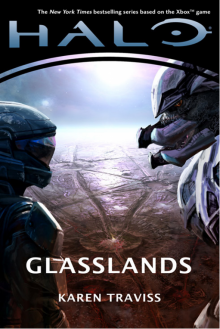 Halo: Glasslands
Halo: Glasslands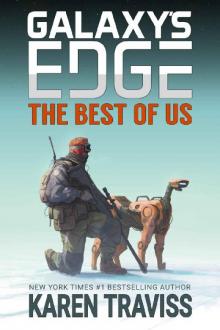 The Best of Us
The Best of Us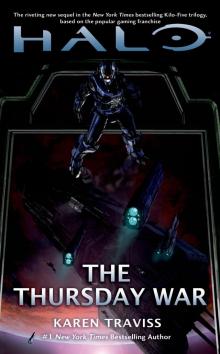 Halo: The Thursday War
Halo: The Thursday War Ally
Ally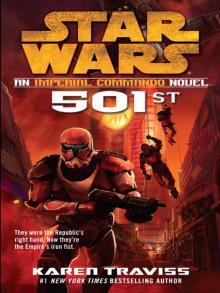 501st: An Imperial Commando Novel
501st: An Imperial Commando Novel True Colors
True Colors Matriarch
Matriarch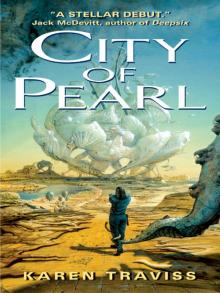 City of Pearl
City of Pearl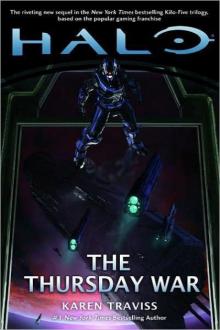 The Thursday War
The Thursday War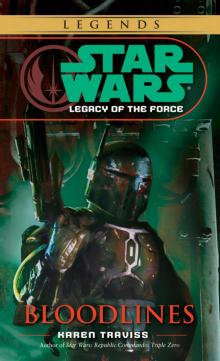 Bloodlines
Bloodlines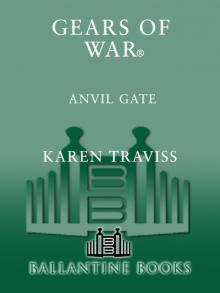 Gears of War: Anvil Gate
Gears of War: Anvil Gate Crossing the Line
Crossing the Line Star Wars - The Clone Wars 01
Star Wars - The Clone Wars 01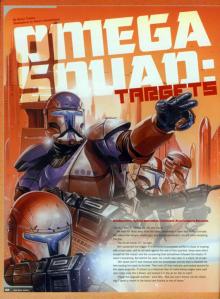 Omega Squad: Targets
Omega Squad: Targets Halo®: Mortal Dictata
Halo®: Mortal Dictata Hard Contact
Hard Contact The World Before
The World Before Order 66
Order 66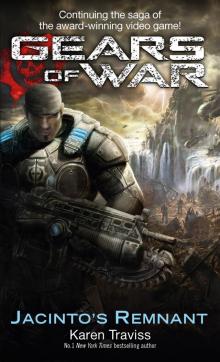 Gears of War: Jacinto's Remnant
Gears of War: Jacinto's Remnant Sacrifice
Sacrifice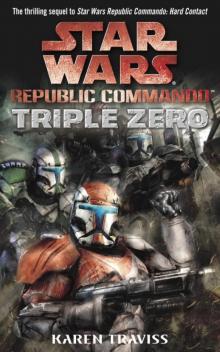 Triple Zero
Triple Zero Gears of War: The Slab (Gears of War 5)
Gears of War: The Slab (Gears of War 5) NEW JEDI ORDER: BOBA FETT: A PRACTICAL MAN
NEW JEDI ORDER: BOBA FETT: A PRACTICAL MAN Going Grey
Going Grey Star Wars: Boba Fett: A Practical Man
Star Wars: Boba Fett: A Practical Man Revelation
Revelation Coalition's End
Coalition's End No Prisoners
No Prisoners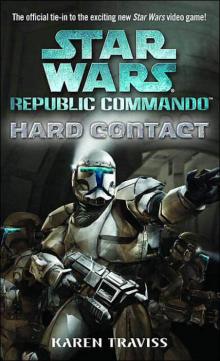 Star Wars Republic Commando: Hard Contact
Star Wars Republic Commando: Hard Contact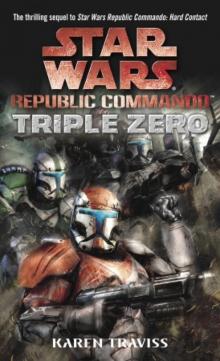 Star Wars: Republic Commando: Triple Zero rc-3
Star Wars: Republic Commando: Triple Zero rc-3 The Clone Wars
The Clone Wars The Clone Wars: No Prisoners
The Clone Wars: No Prisoners Star Wars: Republic Commando: Hard Contact rc-1
Star Wars: Republic Commando: Hard Contact rc-1 Judge
Judge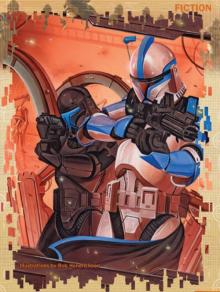 Omega Squad: Targets rc-4
Omega Squad: Targets rc-4 Star Wars - Republic Commando - Hard Contact
Star Wars - Republic Commando - Hard Contact